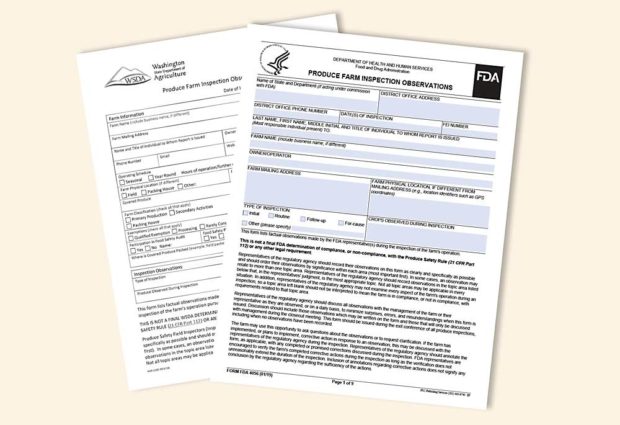
Prepare for visitors.
Food safety inspections of farms and packing houses have begun as the federal government and state agencies continue to roll out the Food Safety Modernization Act, or FSMA.
“That’s the big news for ’19,” said Kate Tynan, senior vice president of the Northwest Horticultural Council in Yakima, Washington.
Most of the Produce Safety Rule, one of the two most significant regulations of the federal FSMA legislation that apply to the tree fruit industry, has taken effect and with it have come inspections this year for farms making more than $500,000 in annual gross produce sales. Smaller farms will have another year to comply, while the water standards of the Produce Safety Rule will take effect in 2022.
The federal Food and Drug Administration, or FDA, the agency charged with implementing FSMA, has told grower groups the first inspections will be educational and collaborative. Everybody is still learning the ins and outs of the 2011 legislation that drastically altered food safety regulation in the United States.
“It’s not going to be punitive out the door,” Tynan said.
That’s at least what FDA officials have said. They still may take enforcement actions, including punishments, if they find egregious conditions that pose an immediate public health risk.
In most states, the respective state department of agriculture will implement FSMA and conduct inspections. Only six states — Oregon, Wyoming, North Dakota, South Dakota, Iowa and Illinois — will let FDA inspectors handle the job themselves.
Washington inspectors promise a soft approach when possible, said Roger Beekman, manager of the Washington State Department of Agriculture. Only an imminent public health risk would trigger enforcement action. “I quite frankly would be shocked if that happened,” he said.
Washington and other tree fruit producing states such as Michigan, New York and Pennsylvania either have started inspections or will soon, said Bob Ehart, senior policy and science adviser for the National Association of State Departments of Agriculture, based in Washington, D.C.
Farm inspections are typically done during harvest, while packing facility inspections may happen any time the company is running fruit over its lines, he said.
Important forms
Kate Tynan, senior vice president of the Northwest Horticultural Council, recommends growers check out several FSMA-related forms.
—FDA fact sheet on what to expect from inspectors: FDA Fact Sheet – Produce Safety Rule
—Draft guidance document with how to comply with the Produce Safety Rule: fda.gov/food/food-safety-modernization-act-fsma/fsma-final-rule-produce-safety
—An FDA inspection observations form for growers in Oregon and five other states that rely on the FDA to conduct FSMA inspections: FDA Produce Farm Inspection Observations. (Note: If you see a “Please wait…” message when you click the link, you will need to download and save the document to your computer in order to open it.)
—A Washington State Department of Agriculture inspection observations form for growers: WSDA Produce Farm Inspection Observations. (In Washington, the WSDA is leading FSMA compliance efforts.)
—The WSDA is surveying food producers to help determine who falls under the Produce Safety Rule. The survey is here: WSDA Produce Farm Inventory survey
How to stay low on the priority list
The states and the FDA inspectors may have a few differences, but they have agreed to stay as uniform as possible in how they prioritize who to inspect first, Ehart said. Wherever they are, there are a couple of things growers can do to stay low on the priority list.
—Have a third-party audit. Meeting the standards of an audit required by certain buyers does not automatically mean a grower will meet FSMA requirements, but some private certification scheme owners have been working to update their requirements to harmonize with FSMA, according to an FDA webpage. Unlike private audits, however, Produce Safety Rule inspections are not annual. The frequency will be determined case by case.
—Conduct an On-Farm Readiness Review, a FSMA “practice run” with inspectors and land-grant university extension specialists. Again, only egregious problems that pose an “immediate threat” to public health discovered during a readiness review would lead to enforcement. (See State agencies offer readiness reviews for FSMA inspections.)
The other factors in setting the inspection priorities fall outside of growers’ control — the size of the farm and the risk level of the crop. So far, it’s uncertain where tree fruit falls on the risk spectrum, Tynan said.
Meanwhile, the federal government is still discussing who meets the definition of a farm and thus, who is subject to the Produce Safety Rule. Growers clearly do, but as for packing houses that also have captive fruit, the FDA has been operating on a 50-50 rule. If at least half of the fruit going over the packing line belongs to the same company, it’s a farm. If not, for now, it’s considered a processor and would fall under Preventive Controls for Human Food, the other major FSMA regulation that affects the tree fruit industry.
After pushback, the FDA has backed off from this idea and is developing an amendment that may pertain more to the activities at a facility than the company ownership, Tynan said. In the meantime, the FDA has decided all packing companies should follow the packing and holding requirements of the Produce Safety Rule or the good manufacturing practices portion of Preventive Controls for Human Food Rule.
Also, growers and packers both should expect surveys from state or federal authorities as they develop inventories of their farms. •
—by Ross Courtney
Related: State agencies offer readiness reviews for FSMA inspections






Leave A Comment